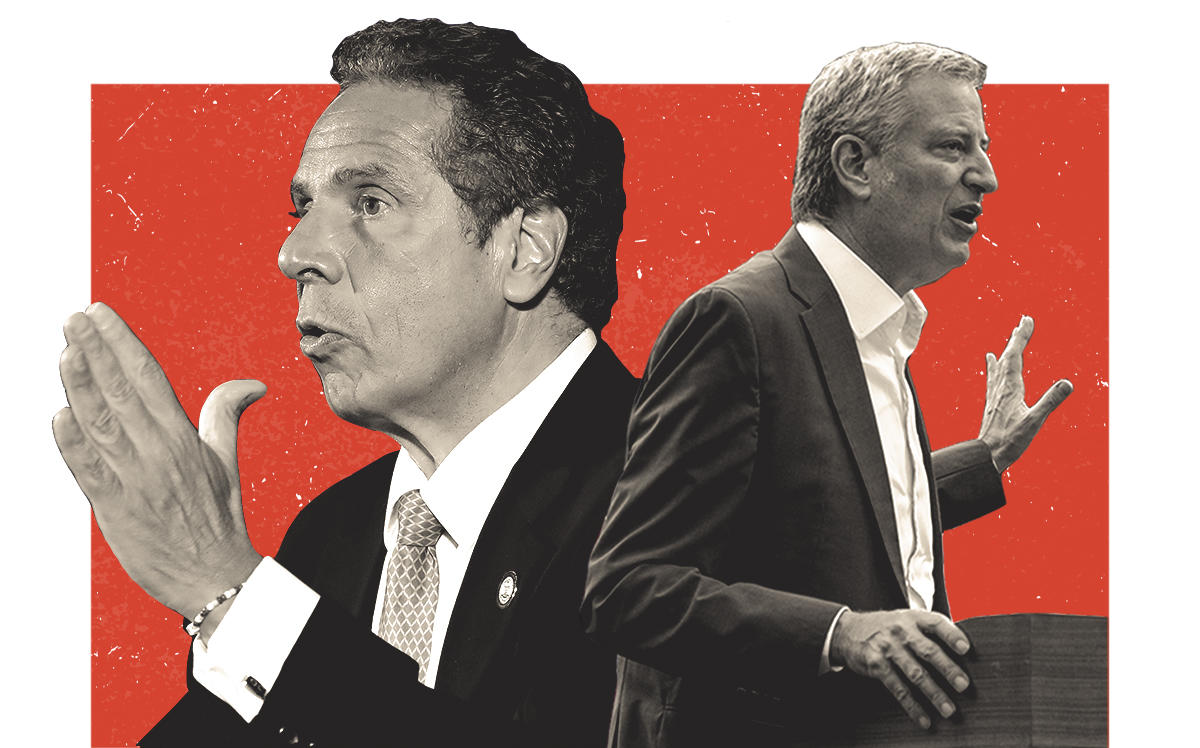Trending
Mayor calls Cuomo’s office-to-resi plan “giveaway” to real estate
De Blasio had previously voiced support for the concept

Mayor Bill de Blasio on Thursday slammed Gov. Andrew Cuomo’s proposal to allow office and hotel owners to convert their buildings to residential use — even though a committee he created had a similar idea.
Testifying on the governor’s proposed 2022 budget, de Blasio said it includes provisions that “usurp the city’s local authority and silence community input.” He said he “strongly opposes” a measure that would override local zoning rules to allow the conversion of class B and C office buildings and hotels with fewer than 150 rooms.
“This crisis is not an excuse to overturn the will of struggling communities and give away local control to wealthy real estate interests,” he said.
The testimony is a reversal of sorts for the mayor. In December, a spokesperson for de Blasio told the New York Times that the administration favored the idea of converting vacant commercial properties into housing.
At time, however, the concept — promoted by the Real Estate Board of New York — had not been hashed out. Gov. Andrew Cuomo unveiled the particulars of his plan in late January, in one of his budget bills.
The idea of converting older office buildings had come up earlier in meetings organized by the de Blasio administration. In a September email reviewed by The Real Deal, Deputy Mayor Vicki Been included it in recommendations from the mayor’s Construction and Real Estate Sector Advisory Council and its subcommittees.
The rub may be whether approval for such conversions goes through the city or state officials.
Under the budget proposal, hotels and offices can become residential if the owner sets aside at least 20 percent of the apartments as affordable, or if the property is used as supportive housing through an agreement with the state or city. Owners can also opt to contribute to a state-run fund that finances affordable housing — meaning income-restricted units would be built elsewhere, not in the converted building.
A spokesperson for the de Blasio administration said that while the mayor is always looking for ways to create more affordable housing, he doesn’t support the avenue proposed by the governor.
“There’s no time to wait in responding to the new reality created by the pandemic,” said Freeman Klopott, a spokesperson for the state’s budget office. “These proposals speed development through what would be years of bureaucratic processes by allowing for the conversion of unprecedented vacancies in commercial spaces to highly needed affordable and supportive housing.”
The proposal would likely be useful only to large office and hotel landlords, as such conversions are costly and take time.
The governor would limit such office conversions to Manhattan between Park and Ninth avenues and 14th and 60th streets. Hotels in the outer boroughs and within Manhattan between the Financial District and 110th Street would be covered by Cuomo’s plan.
Jay Martin, executive director of the Community Housing Improvement Program, which represents the owners of more than 400,000 rent-stabilized apartments, supports the proposal, but said elected officials should also consider immediate relief for owners.
On Thursday, de Blasio also called on the state to “tax the wealthy” rather than cut education and health spending. Cuomo has threatened to raise income taxes on high earners if the state doesn’t receive $15 billion in federal aid.
The mayor also voiced opposition to a proposed workaround to Local Law 97, a city measure to curb greenhouse-gas emissions. Cuomo’s budget measure would let building owners buy renewable energy credits outside the city to offset their properties’ emissions. The real estate industry has long called for this change, calling it the only reasonable way for some buildings to meet the law’s targets.
De Blasio also requested that the state budget add a tax rebate for owners of one- to three-family homes with “low and moderate market value.”




